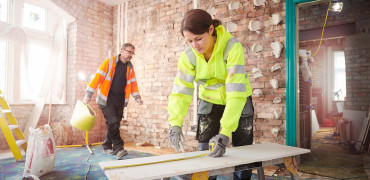It’s time to start charging up UK customers’ awareness of heat pumps, if there’s any hope of reaching our short term aims to achieve 600,000 heat pump installations in five years.
Currently it’s believed that only around a ninth of that total has been achieved, and while it remains unclear whether a different government administration would maintain this firm target, they’re unlikely to change it significantly.
However, while we might assume that most people now know about heat pumps, with a lot of recent media attention given to them, this would be a mistake!
Mitsubishi Electric undertook some research with IPSOS to find out just what awareness levels were like currently, and the answer was not too reassuring. They surveyed 1000 people in May, and although a decent proportion (41%) thought that the Government were right to move towards a decarbonisation deadline, seven out of 10 people surveyed hadn’t even heard of heat pumps.
This is extremely worrying and possibly a failure on both the Government and industry’s part.
The worrying finding for the Government is that people don’t trust them to deliver on climate change
Hydrogen is not the answer
As Mitsubishi Electric’s resulting white paper states, 2026 is the ‘big date’ - any new gas boilers installed need to be ‘hydrogen-ready,’ but as Ipsos’ energy expert points out, “it could be that hydrogen isn’t going to be in the British energy mix going forward.” This may not please installers used to installing combis, but it is a scenario that needs to be wrestled with.
This might be true, but also true is that consumers don’t generally know enough about the ins and outs of heat pump technology, and the likely reliability they can expect, based on the data gathered in the survey.
It was also backed up by news from Scotland’s second Green Home Festival, whose organisers reported that government and industry now have to work closely to tackle ‘misinformation’ around low carbon tech.
Event co-organiser Fiona Hodgson, who’s CEO of plumbing and heating association SNIPEF, said: “Discussions at showed that there is still a significant degree of confusion and misinformation around the costs and benefits of low-carbon technologies, much of which hinders people from making informed decisions about sustainable living.”
“It’s vital for the government and the construction and energy sectors to work collaboratively to create a more consistent and cohesive messaging strategy to counter and myth-bust this misinformation.”
The awareness ‘barrier’
Mitsubishi Electric’s report has some frank conclusions regarding current public awareness levels of heat pumps, saying it was a “critical barrier” for heat pump adoption, and that they are “not yet considered an established technology by most British consumers.”
This was allied to a “lower level of trust in their reliability,” common to most new technologies, but this was partly down to there being “no reliable, widely trusted sources of information.”
A further finding was that “installing a heat pump was one of the most significantly under-appreciated behaviour changes” for consumers looking to improve their energy efficiency, before we even look at the need to improve fabric of buildings to ensure heat pumps’ effectiveness.
Don’t forget the cost of living crisis
The other issue, of course, is that the cost of living is increasingly obscuring sustainability goals for many consumers, such as those in the ‘squeezed middle,’ as for example, mortgage payments continue to rise.
This is not shied away from by in the Mitsubishi Electric report. 55% of consumers surveyed thought that the cost of living crisis should come above residential heat decarbonisation and household energy efficiency in terms of our priorities.
The company has approached the issue of the continued ‘cost of living crisis’ by turning it into a positive message for those considering upgrading to heat pumps now, on the back of its survey data.
This is based on the figure of two out of three of its survey respondents believe that ‘the worst of the cost of living crisis is still to come,’ and the notion that social housing in particular will see cost of living benefits for tenants by installing heat pumps via Green Home Grant Voucher Schemes, and ECO3.
This of course doesn’t tackle those middle-income consumers fretting about their escalating bills, who might be the large cohort ready to install heat pumps if given the right support.
Recommendations for Government
The report recommends that Government does several key things. Use a ‘number of’ regulatory and financial levers to scale up adoption, including “decoupling electricity prices from gas prices’ to ensure that green levies don’t hit electricity.
Also, they believe that the 2026 ‘decision’ date needs to be brought forward to hasten decision-making, and Government funding of major installer training programmes, so it’s not all left to industry.
Lastly, the Government “must provide clear communications to drive awareness and understanding, via a network of trusted advisors.” This means “easy, impartial advice” on the steps they can take, and “targeted communications that promote the core drivers for heat pump installation, rather than simply relying on sustainability as the presumed purchase driver.” This will be essential to tackle the “trust vacuum” that exists, says Mitsubishi.
The big positive finding is that 42% of people have ‘some interest’ in installing a heat pump.
This needs to be turned into ‘firm commitment,’ via strong measures such as Mitsubishi have highlighted, so that we can make a decisive shift away from gas as a nation.
Probably the most worrying finding of the report for the Government is that people don’t trust the government to deliver on climate change, although believing it is their responsibility. Whoever comes into power in 2024 needs to make repairing this their number one priority.
James Parker is editor of Housebuilder and Developer




